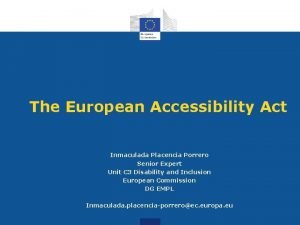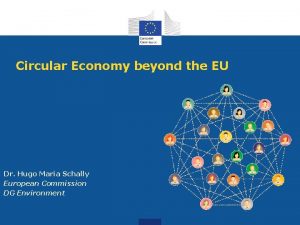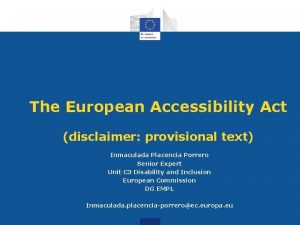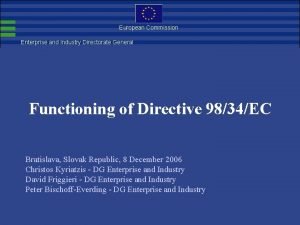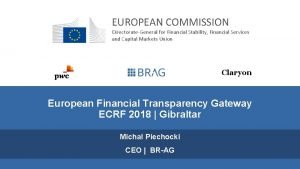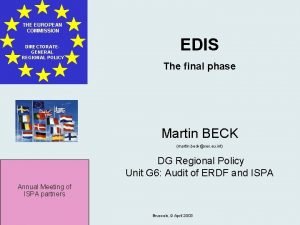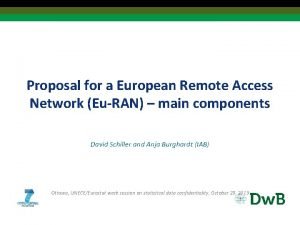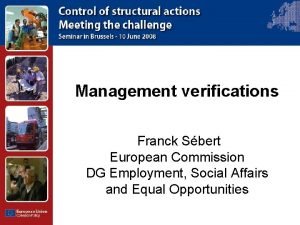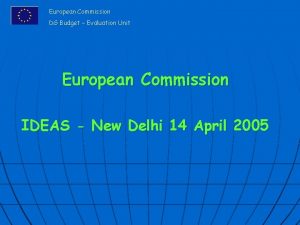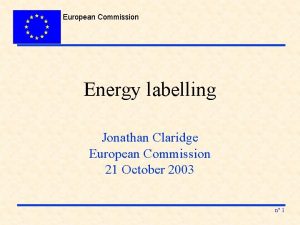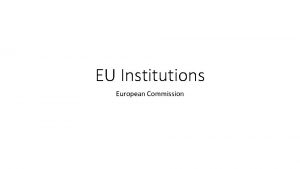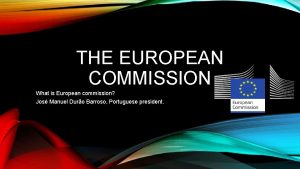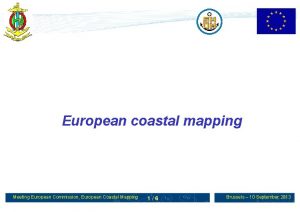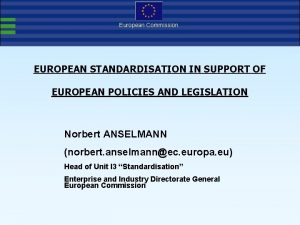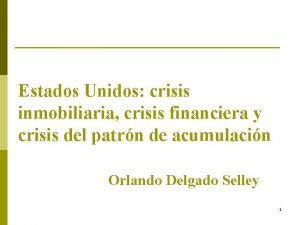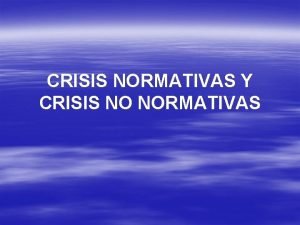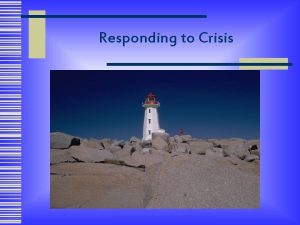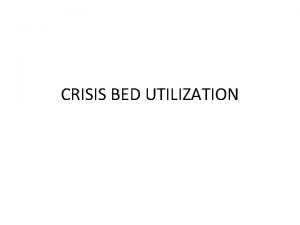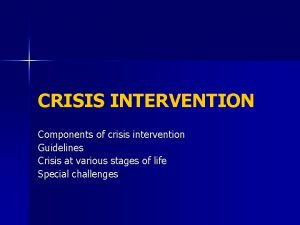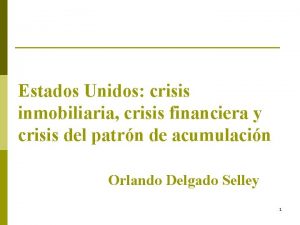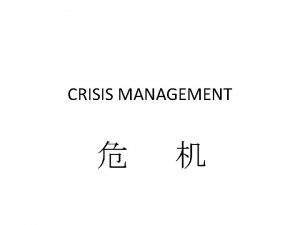Communicating the crisis the European Commission on social





















- Slides: 21

Communicating the crisis: the European Commission on social media during the economic crisis in the European Union Domagoj Bebić, Faculty of Political Science, University of Zagreb Milica Vučković, Faculty of Political Science, University of Zagreb Marija Volarević, Faculty of Social Sciences, University of Ljubljana

Introduction • Relying on the optimistic ideas that social media can improve communication between representatives and the represented, we test to see if the European Commission used Facebook in order to improve communication with citizens. § We use discourse analysis as a qualitative content analysis to look at status messages on the EC official Facebook page from 2010 until the end of 2012 focusing on which themes were encouraged by the EC and in which way did the EC communicate the crises to European citizens. § Moreover, conducting a content analysis as a quantitative analysis we examined how often each theme was in the main focus of the status update. § Finally, we examined the European Commission’s response rate to establish how willing was the EC in engaging in communication with citizens via social media.

Economic crisis in Europe • In The first decade of the new millennium the world was faced with a new economic crisis. Starting as the subprime mortgage crisis in the US in 2007, it soon unfolded as a global financial and economic crisis, becoming a fiscal and social crisis and in some countries even a crisis of democracy (Bieling, 2012: 255). • In 2015 the world economic market is still recovering from the economic collapse that hit the global market and was the biggest crisis since the Second World War. Starting in 2008 in only few months it affected all modern markets, including the European Union market too. •

European Commission • The European Commission, along with the European Parliament and Council, is one of the most important bodies of the European Union. It represents the general interests of the European Union and it is not politically responsible to the member states (Ćapeta, 2011: 39). • Also, it represents and upholds the interests of the EU as a whole: it drafts proposals for new European laws, manages the day-to-day business of implementing EU policies and the use of EU funds. • Traditionally described as ‘the guardian of the Treaties’, the European Commission’s role is to defend the interests of the European Union while remaining politically neutral.

European Commission and Internet • In 2010 the European Commission proposed a 10 -year strategy named “Europe 2020” that, among other important issues, underlines seven flagships initiatives to catalyze progress under each priority theme. • Europe 2020 – 7 Flagship initiatives: (1) Innovation Union; (2) Youth on the move; (3) A digital agenda for Europe; (4) Resource efficient Europe; (5) An industrial policy for the globalization era; and (7) European platform against poverty • One of the flagships was “a digital agenda for Europe” whose aim is to deliver sustainable economic and social benefits from a Digital Single Market , based on fast and ultra-fast Internet and interoperable applications, with broadband access for all by 2013, access for all to much higher Internet speeds (30 Mbps or above) by 2020 and 50% or more of European households subscribing to Internet connections above 100 Mbp. •

European Union institutions and econimic crisis in the media coverage • The Reuters Institute for journalism at the University of Oxford conducted research in 10 member states of the European Union with the goal of detecting and interpreting the frame of the European Union and its institutions in the context of the economic crisis in the print media coverage of the selected states. • It is a large-scale project directed by the Reuters Institute with partners examining coverage in Belgium, Finland, France, Germany, Greece, Italy, The Netherlands, Poland, Spain, and the United Kingdom.

• In this wide study more than 10, 000 articles from 40 newspapers in 10 countries from 2010 to 2012 have been analyzed in order to detect the main themes in the coverage, as well as the events and personalities covered, the extent and nature of the coverage and the scope and balance of the opinions expressed. • Besides analyzing the differences among national media coverage regarding the economic crisis in Europe, the goal of this research was to provide insight into how the media informs, frames and shapes the dominant crisis narrative (Murray-Lech, 2014).

• Individual data from member states show that the crisis and the role of the European Commission in it was an important part of print media coverage in the examined member states of European Union. • Conducted research revealed that the stories about European Commission were mostly written in a form of news story in the first ten pages of the newspaper and usually in the section of business or finance. • The perception in the media in most of the analyzed countries was that European Institutions, as well as European Commission, were perceived as ineffectual and confused in addressing the crisis. • The data showed that European Union and its institutions were perceived mostly negative in the print national media during the time of crisis.

• Furthermore, analysis suggests that in the most member states root of the crisis refers to political roots, structure of the Euro system as well as to the national fiscal and social policies. • In most member states the responsibility for the crisis refers to the members of the Eurozone as a group. • Analysis also detects the proposed solutions for the crisis in the national media of the member states. In most cases loans from other countries that were dealing with the crisis better were proposed as solutions. • This research shows that the contextual and metaphorical frames in which the crisis was reported usually dealt with a negative context regarding war, illness, battle.

Empirical part • Relying on optimistic theories about the role of the Internet which suggest that the Internet can improve communication between governments and institutions and citizens, and that it can restore citizens’ trust in institutions (Coleman 2003, Small, 2006, Foot &Schneider 2006; Grossman 1995; Ward, Gibson & Nixon 2003), we wanted to test if the European Commission, as one of the important bodies of European Union, uses social media to communicate with citizens. • Since European Union institutions are framed mostly in a negative context in print media and euro skepticism is a well represented topic, it could be expected that the European Union and its institutions will use alternative unmediated platforms to communicate important issues with citizens and to overcome euro skepticism.

Research design • In order to reveal if and how the European Commission used Internet during the economic crisis we propose three main research questions: • (1) Did European Commission recognize social media as an important means of communicating with citizens; • (2) did the European Commission communicate about the economic crisis with citizens on its official Facebook page; and • (3) What were the main topics of its status messages on the official European Commission Facebook profile in the period of economy crisis?

• To answer these questions we analyzed 285 Facebook status messages on the official European Commission Facebook page from June 2010 (when the European Commission opened its official Facebook page), to the end of 2012 (when the intensity of the crisis in most of the EU member states was in decline). • Using qualitative analysis we revealed the main themes in focus in the European Commission’s communication with European citizens up until the end of 2012. • Using quantitative analysis we examined how often each theme was in the main focus

FINDINGS Main themes and Overall focus of the status messages (%) 70 53 35 18 0 Economy Regular European Union policy Democracy Member states policy Refrence to the countries who are not member states Reference to history Reference to certain people in the Union Other

Sub-themes and crisis • The second part of the study deals with the presence of certain issues in the EC’s status messages. For each status we coded every sub-theme in order to reveal the frequency with which specific issues were mentioned. • The data show that in the examined period the EC’s official Facebook channel dealt with theme of the economy in 7% of the examined status messages, while the crisis was mentioned 14 times in the examined time period. • Furthermore, the crisis was mentioned in the context of providing solutions or information to overcome it. Yet, most of the time it was mentioned in the context of neglecting the seriousness of the issue and promoting certain EU initiatives. During this period the EC also never mentioned any kind of responsibility for the devastated economy in the Union. •

The frequency of mentioning economy issues 16 12 8 4 0 Reconstruction Market economy Employment / unemployment Number of mentioning the sub-issues Economic crisis Green policy and sustainable development

The frequency of mentioning regular EU policy issues 90 68 45 23 0 EU news National development European initiatives Policy for young Number of mentioning sub-issues European Union policy

The frequency of mentioning democracy related issues 30 23 15 8 0 Pluralism and human and minorities rights Criminal, corruption and nepotism Number of mentioning sub-issues Rule of law and justice

Conclusions • The data show that the European Commission in the period of economic crisis usually used its Facebook account to promote and communicate its projects, plans and achievements. • During the period of research a great number of the status messages highlighted the initiatives of the European Union or the specific interests of certain social groups. • Furthermore, our research shows that the EC was eager to stimulate discussion and action of users, inviting them to view some material , to comment, answer questions or to do some offline action (to vote, to watch some material on other media, or to get involved in a project). • As a result, in the examined time period more than eight thousand comments were posted on the EC’s official Facebook fan page, there were more than 18 thousand Likes on the 285 examined status messages and 10228 shares.

• The difference in technical details of status messages is evident during the years. When starting the communication on Facebook in June 2010 the EC’s status messages usually consisted of some text or a picture. Later on, the EC’s status messages on Facebook became better equipped - with links to other sources, tagging people, posting more photos and videos. • During the examined time period out of the 285 status messages 81 had photos, 215 of them had links to another website and 43 had videos.

• Our analyses showed that during the delicate period of crisis in the European Union, the European Commission mentioned economic crisis, which influenced the economy of entire Union, only 14 times on Facebook. • Our findings suggest that European Commission in general recognized Facebook only as a notice board while it did not recognize its Facebook page as an important platform for communicating with citizens. • Bearing in mind that European institutions are often perceived as ineffectual and that their role remains vague and unknown to citizens, it is quite surprising that the EC did not use social media in a more communicative manner in order to clarify its role, policies and functions, especially during the economic crisis. • Furthermore, social media is often a valuable source of information

• Since the European Commission itself stresses the importance of the Internet and new communication platforms, as it is underlined in its strategic document Europe 2020 , it remains to be seen if the European Commission will start using social media platforms more efficiently in the future. • Moreover, a great number of citizens’ comments, likes and shares on the status messages in the examined time period, suggest that citizens are willing to engage online if the platform for engagement is provided. •
 Processus vaginalis
Processus vaginalis Itk sisekliinik
Itk sisekliinik Traineeship office european commission
Traineeship office european commission Martine deprez european commission
Martine deprez european commission European commission
European commission Brendan devlin european commission
Brendan devlin european commission Ecodesign working plan
Ecodesign working plan Anic tschumi
Anic tschumi Inmaculada placencia porrero european commission
Inmaculada placencia porrero european commission Eu taxonomy
Eu taxonomy European commission
European commission Dr hugo maria
Dr hugo maria European commission
European commission Inmaculada placencia porrero european commission
Inmaculada placencia porrero european commission Cost benefit analysis european commission
Cost benefit analysis european commission European commission
European commission European commission
European commission European commission
European commission European commission
European commission European commission
European commission Remote access european commission
Remote access european commission Franck sebert european commission
Franck sebert european commission








